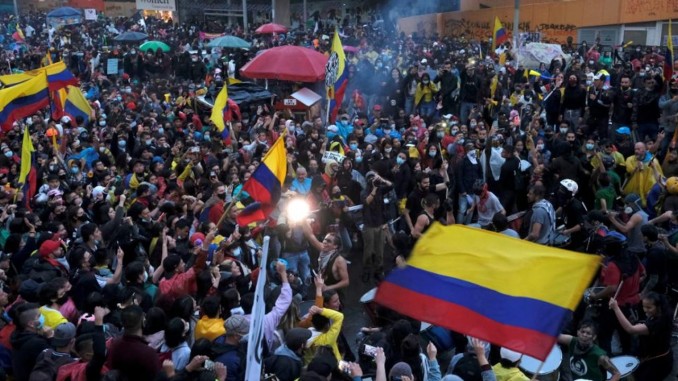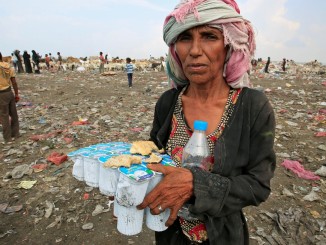
The mobilization initiated on April 28 in Colombia is not letting up, despite the military and police repression, not to mention the death squads. Many who have disappeared during arbitrary arrests have been found dismembered in dumpsters and images are circulating of corpses thrown into rivers. In Cali (the third biggest city in Colombia), bodies that are still alive are set on fire, those wounded by acid-filled projectiles are being counted, those wounded by bullets are legion; and the regime’s generals are threatening to unleash all the power of their violence by mobilizing all the armed forces, every soldier, every reservist, if in June the country is still plunged into “chaos”. Moreover, on Saturday, May 29, President Duque gave the army carte blanche to crack down on Cali, a hotbed of social protest, where ten people were killed that day alone. That same day, tens of thousands of people demonstrated in the country’s major cities. Officially, there were almost a hundred dead, more than 800 missing and thousands injured. The Colombian revolutionary activists with whom we are in contact expect several hundred to be victims of the repression.
It is in this critical context that young people from the neighborhoods, workers, students, and young women like Arcoiris (Rainbow in Spanish) continue to fight. She is in her early twenties and has traveled from her home region to participate in the movement.
The “Primera línea” (front lines)
“From the beginning, I was in the front lines,” she says. When the call for the mobilization of April 28 was issued, she decided to leave her region, moving as best she could in a territory with almost no railroads, from the north of the Cauca Valley to Cali, the epicenter of the resistance for more than thirty days. She knew that something would happen there. Arcoiris worked in front of the webcams, as a “porn actress” she says half embarrassed, laughing; she could not make ends meet. She says “I have never eaten so well in my life as on these barricades” and this thanks to the collective meals organized by the protesters. Before she was always hungry, she says “in this country everyone is hungry and many have lost their homes … They say we are tipping the country into collapse but everything was already in this state for a long time. ”
At the points of resistance, at road blockages, each one chooses his position or invents it, some are in the kitchens, others in logistics, like his comrade, whom we will call Lluvia, which means Rain. At these points of resistance, they block the traffic, but they also manage the entry and exit of humanitarian convoys, food, gasoline, medicine. Real emergency hospital centers have emerged and they are managed by doctors, surgeons, or nurses.
“Yes, they are not just medical students or hospital staff angry about working conditions, some of them have not been paid for months… hospital workers of all situations come to give us a hand, because often we have to operate on the spot, and extract the bullets as quickly as possible.”
In the open
Arcoiris has not been elected a spokesperson – “vocera” – by a vote in the popular assemblies that are held on a daily basis, unlike her comrade Lluvia.
“I am a spokesperson for Uni-resistencia… but I was not elected. When I arrived in Cali, I immediately took my place in the front lines at this spot that used to be called Univalle… a few days later the massacre of La Luna, the name of another resistance spot, took place. The police and the army shot at them… “volearon bala” (they rained bullets) and many of my friends died. I spent the night crying. What pissed me off the most was what they were saying in the shitty media, RCN and Caracol. They kept saying that they were terrorists and their argument was that if they were innocent they would not have had their faces covered. So the next day I decided never to cover my face again. My comrades, seeing that I was showing my face in the front lines, immediately appointed me to be a spokesperson. They said to me, “You have the courage to expose yourself… you are the one who will speak. ”
Grassroots democracy gets organized
During the assemblies she does not often speak, she prefers to listen and to make sure they stick to the agenda. She recounts the “assemblies of the assemblies”:
“After the local assemblies, which are held every day, in which we discuss the political and cultural agenda, the political and self-defense proposals are gathered and brought to the assembly of assemblies. It is in this framework that all the spokespersons of the twenty or so points of resistance in the city of Cali meet, it is there that strategic choices are made for the continuation of the movement at these blockade points. They exchange about the demands that are carried by all, but above all, people finally speak about what they have been experiencing for years… It is not always very disciplined, but we learn day after day to respect the turns of speech, and in truth I don’t believe that all this mess is bad. Some people go into a trance, literally, when they have the microphone. They say what happened to them, to their families, and they don’t want to shut up anymore. There’s something like group therapy going on.” She did not see fit, in order not to protect the protesters, to tell us the number of people who participate in the meetings or to give the size of the locations.
The political outlook
She does not know if they will win; Arcoiris is pessimistic. She thinks that “Uribismo (named after former president Alvaro Uribe’s regime of corruption and violence related to drug trafficking and expropriation of peasants) is too systematized,” and above all that she will not be able to be there to see the end of this regime. “I will be dead in the meantime… anyway, I don’t care if I die now, it’s either this or starve to death. It doesn’t matter. I think we’re even bugged now,” she laughs, “let them see me, I know I’ll get shot sooner or later, during or after all this. At least now everyone is forced to face what we’ve been hiding for years… and look, we’ve made them drop the reforms. Change is slow. It won’t all happen in one day, but we’ve started a movement; we can’t let it stop.”
A generation gap
She talks about the elders, about how their minds have been “brainwashed” by the national media, for years. “Even today, many don’t understand anything about what’s going on. They don’t go on social networks like we do… my mother asked me: “Why are you risking your life for nothing? You have to pay what they tell you to pay and then that’s all.”
Her mother doesn’t understand that they are tired of living without a horizon. According to Arcoiris, there are two problems linked to the decades of propaganda: the problem of political pedagogy, because it is necessary to explain what a tax reform is, and how it will worsen living conditions, and what will happen with the excessive privatization of health.
“We try to organize at the assemblies of the assemblies, to explain to people why we are there; we spend our time repeating, explaining…”
But there is also the fact that most people think that politics is not for them, when they should be involved. This depoliticization annoys her to no end, “that’s how they got us used to living in misery”.
She looks at the situation coldly, yes there are many young people in the street, but we remain divided, with the workers for example. Certainly, some of them have left their jobs and joined us, but they are not numerous. She complains, “people only think about filling their plates, they are afraid of losing the crumbs they are given and then yes… to that is added the threat of being killed”.
It is about 6:30 p.m. in Cali, Arcoiris continues her story while she prepares her meal. She warns that she will have to leave the call soon. She is at a resistance site and she constantly checks that the sentries are at their post. They are indeed often attacked by the police and the military, but also by the inhabitants of Ciudad Jardin, a secure residential area where those who belong to the highest echelons in terms of income live. It is the wealthier strata that harass them with threatening videos on the networks and all sorts of ultimatums. At night, they come drunk and drugged, shooting randomly at the barricades, screaming like crazy and driving luxurious SUVs. There is little sleep at the points of resistance, everyone is exhausted, on edge and you can feel it at the assemblies.
Arcoiris watches the area, that’s what she does when she gets up and goes to bed. She checks that everyone is there, that everyone is okay, and then she takes a look at the shields, the sticks, everything they have available to defend themselves. At dawn, the cars are put back in place to block the road, the barricades are rebuilt, and then the women who cook arrive to prepare lunch. They will have to face those who do not understand again, and those who are annoyed by these blockades, but also the police, the army and the militia in white shirts.




